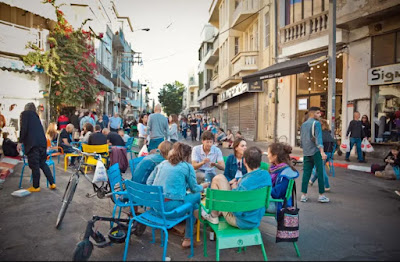Ticket stub from Jerusalem's former Edison Cinema from the ICC exhibit "Stars Over Zion Square." Courtesy of the collection of Hedy Or.
30.9.20
28.9.20
Rehov HaMashbir
Jan '20 Excerpt
Beyond the garment storefronts along Derekh Yafo and the dilapidated and nearly crumbling buildings that stretched further into Florentine, I walked the block or so over to Rehov HaMashbir and found the doorway at number 18 slightly ajar. I could see the same darkened drapes still hanging over the second floor window, and directly across, two stained glass Magen Davids and a menorah, both somewhat rusted and fading in colour, also still atop the synagogue on the opposite side of the street. The newly pedestrianized stretch of Levinsky Street by Tony and Esther was a sea change, but around the corner everything here appeared almost as it was nearly ten years earlier when I had just settled back in Tel Aviv after finally marking the end of my army service.
Earlier that evening after returning from Jerusalem I managed to go through some tattered notes and photos that brought me back to that same time and refreshed some old memories. I contemplated stepping into the entrance to see if the staircase that I trekked up and down so many times had managed to be repaired. And also to quickly glimpse the ornamental tile floor at ground level that was so similar to the interior floor scheme of my old flat. I peeked inside and walked in a few steps, but didn't go much further. I saw from a distance that the stairwell had been moderately fixed and instead I went back into the street, where sounds from Levinsky fixedly echoed, and I decided to keep walking.
21.9.20
Emanuel Litvinoff
18.9.20
Herzl 16
I've been thinking about the many garden cafes in Tel Aviv, those that are open and those that have closed some years ago. Here is one current favorite.
13.9.20
Emmaus-Nicopolis Monastery
There was a great piece in Haaretz's weekend supplement recently about how Israeli Jews are finally visiting and discovering the beauty of the country's various Christian monasteries and their stunning gardens. The article focuses on a new book published in Hebrew called "God's Garden's in the Holy Land" by Ami Zoran, which is extremely timely due to the current increase in domestic tourism. The book provides a photographic and historical profile of 42 of Israel's garden monasteries. I look forward to hopefully getting a chance to read through it soon. The book seems is perfect for those looking to step outside their familiar boundaries and explore these amazing sites.
11.9.20
מיכאל שלי
Amos Oz's 1968 masterpiece, My Michael, in its original Hebrew. Published by Keter Books.
10.9.20
Apocalyptic America
Downtown San Francisco along the Embarcadero at 10:55 am. Wildfires continued to rage throughout California and the West Coast.
9.9.20
Preliminaries
Lately I've been staying awake later and later and not sleeping enough. The other night while packing and streaming whatever random set was playing on NTS at that hour, I came across a few battered notebooks with scrap pieces and short journal entries from some of my former and more recent travels. They stretched from Romania to Paris and London to Israel, and also included shoddily written thoughts and sketches going back to life in Tel Aviv circa 2011-2012 and the immediate months after I finished reserve duty and subsequently ended up traveling to Berlin.
6.9.20
Another Saturday Night from Jerusalem
Protests against Prime Minister Netanyahu have continued week after week each Motze Shabbat in Jerusalem's Paris Square.
3.9.20
Down Hackney
So far I haven't lived up to my promise to go back to writing more consistently, but hopefully this will serve as a positive catalyst. I finally received my copy of Roland Camberton's Rain on the Pavements. It's been nine months since I was last in London and clearly a lot has happened since then. Just being able to actually hold a copy of this book is a real thrill. The copy I have is the 2010 reissue featuring Iain Sinclair's introduction. The cover is a reproduction of the original 1951 publication. It's only the second published edition and has since gone out of print again. I don't want to get ahead of anything and I'm trying to temper expectations, but to say that I'm excited to finally read it would be an understatement.
In the interim, I finished up There's No Home and I'm now almost done with a new compilation of essays and interviews about Alexander Baron and his novels titled So We Live. It seems like so much leads back to Hackney and the former East End, specifically to the forgotten Jewish voices of a largely secular, working-class community that no longer exists. The book is a fascinating exploration of a very private man, someone who did not outright disappear like Camberton, but nonetheless also faded from the public eye. A lot of questions about Baron's life are answered in the series of essays and archival interviews which discuss his wartime service, and even more intriguing, his awakening as Jewish writer and the influence of the Holocaust on his work.
2.9.20
Shuk Levinsky
Street scenes on the relatively new pedestrianized portion of Shuk Levinsky in Tel Aviv. A lot has changed in the area since my former days on Rehov HaMashbir, but it was great being back in the area this past winter and I will try and add a bit more soon.











